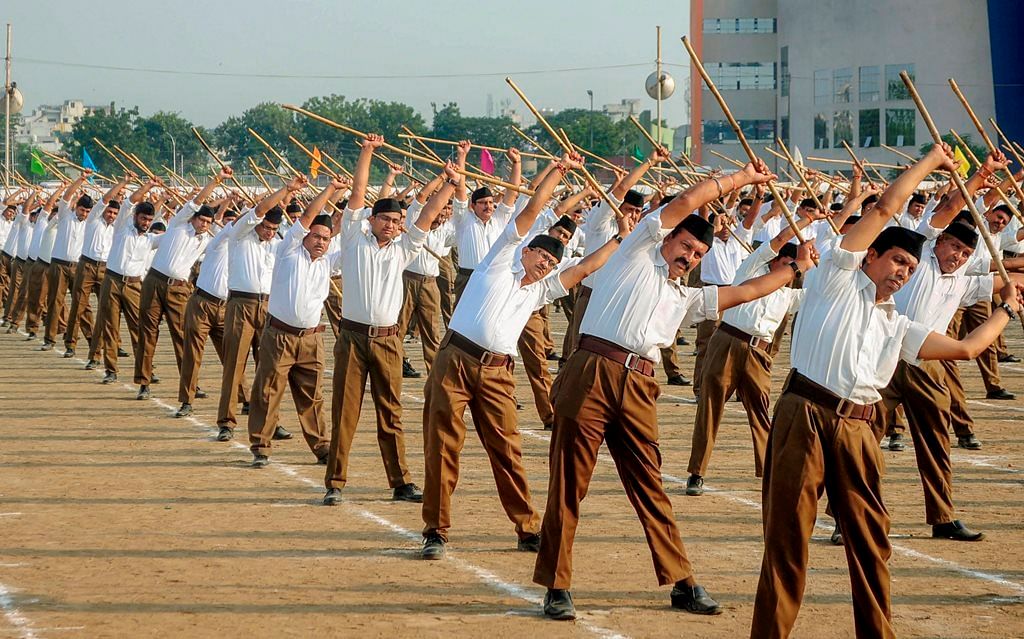NEW DELHI: It took the efforts and resources of a simple Central government retired employee to remove the ban on government employees from associating with the Rashtriya Swayamsevak Sangh (RSS). The ban was imposed on 30 November 1966 by the then Congress government.
The ban was not reversed even by the two successive BJP-led governments in 1998 and 1999 when Atal Bihari Vajpayee, himself a product of the RSS, was Prime Minister. It continued even after 2014 when BJP came to power at the Centre once again. BJP and RSS leaders, commenting on why the ban was not removed till now, said that perhaps no one was aware of this ban or thought it was not an important issue that needed to be dealt with.
The Indore-based Purushottam Gupta was four years old when the ban was imposed. When he started understanding things happening around him, he found that his father, a teacher in a government school, was secretly attending the shakha (branch) of the RSS as it was a banned organisation for government employees. Along with his father, Gupta too started attending the shakha, a practice he continued until 1982 when he joined the Central Warehousing Corporation.
When he retired on 30 June 2022, he realized that even after retirement, the ban would apply to him and he couldn’t join the RSS, and if he did, it would lead to seven years’ imprisonment.
After this, Gupta decided to challenge the order in court. The case came up for hearing for the first time in the Indore High Court in September 2023, and after six more hearings, the final order was announced by the court on Thursday.
The ban was revoked after Government of India, during the hearing, filed an affidavit on 10 July stating that it decided to remove the mention of RSS from the list of organisations that employees are banned from joining.
The final court order, apart from bringing the relief sought by Gupta, also revealed that the ban was carried out without any survey or any inputs by any agencies, as is the norm applied while banning any organisation.
The court found that there was no substantial material, study, survey, or report submitted at the time of the ban to justify the government’s decision. Despite repeated opportunities, the present government failed to file a reply, leading the court to direct the presence of senior officers for effective adjudication. The court repeatedly enquired about the basis for the ban, but no satisfactory response was provided, suggesting that the ban might have been imposed without any solid evidence. The court also found that the ban, which lasted for almost five decades, was not periodically reviewed to assess its necessity, as is the norm.
In fact, the court repeatedly requested the government to file a reply. Specifically, on five different dates, the court enquired about the basis for the issuance of the circulars and office memorandums (OMs) that restricted Central government employees from associating with the RSS. Despite these repeated requests, the government failed to file a response, leading the court to direct the presence of senior officers for effective adjudication.
The lack of response implied that the ban might have been imposed without substantial evidence, the court observed, merely to suppress an organisation opposed to the government’s ideology at the time.
“The court, in the absence of any reply filed by the Union of India to the said effect (despite being inquired again and again), is compelled to believe and presume that perhaps there was never any material, study, survey, or report at the relevant point of time on the basis of which the ruling dispensation arrived at a satisfaction that involvement and engagement of central government employees even with the apolitical/non-political activities of RSS must be banned for maintaining the communal fabric and secular character of the country,” it noted.
In mid-2023, the RSS was running around 72,000 shakhas (branches) across India and its plan is to have 1 lakh such shakhas by the end of 2025, which is the centenary year of the influential social and political organisation.
With the recent development, it is expected that more professionals from both public and private sectors will join the organisation in the coming days. According to RSS functionaries, this will bring a necessary influx of rich minds and intellect from across the country into the organisation’s think tank.

